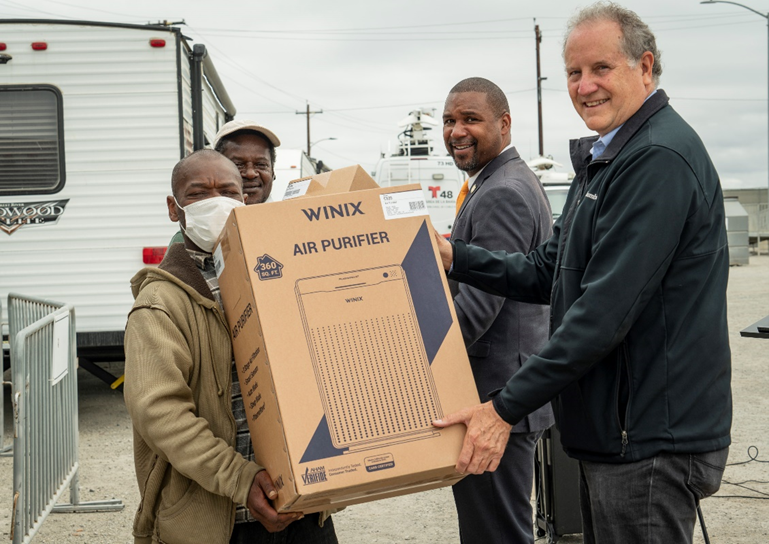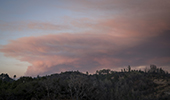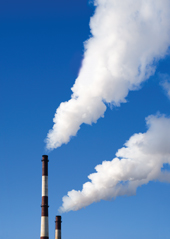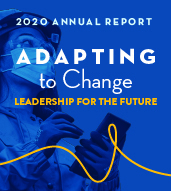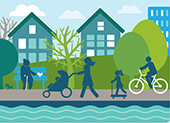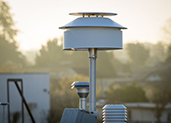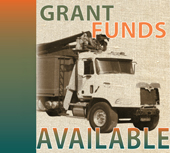|
|

|
|
|
|
August 2021 l Volume 2021-3
|
|
|
|
|
|
|
In this issue you'll find articles about the Air District's delivery of air filtration units to Pier 94 housing residents, the Air District's tips for preparing for wildfire season, the Air District's passage of a new refinery regulation, and the rollout of a new Commuter Benefits Program telework compliance option. Other articles spotlight the Air District's 2020 Annual Report and several upcoming community-focused initiatives and events. A recent Benicia Air Monitoring workshop is also covered, as well as a recent settlement with Tesla and a summary of current grant opportunities.
|
|
|
|
|
|
|
|
|
|
|
|
|
|
Air District Delivers Air Filtration Units for Pier 94 Transitional Housing Site Residents
|
|
| | |
|
In June, the Air District announced the delivery of air filtration units for residents of the Pier 94 transitional housing site in the Bayview Hunters Point neighborhood of San Francisco. The site includes more than 120 RV trailers and was established by the City of San Francisco last year to shelter unhoused residents and better protect public health during the COVID-19 pandemic. Materials recycling and handling facilities operate nearby and can potentially impact air quality near the housing site.
To help address the potential exposure of shelter residents to particulate matter from these nearby industries and future wildfire events, the Air District delivered air filtration units and replacement filters to the United Council for Human Services to distribute to all Pier 94 transitional housing site residents. These units use high-efficiency technology to trap particulate matter and clean the air inside trailers for residents. The United Council for Human Services is the organization tasked with supervising the Pier 94 site and providing services to its residents.
The Air District held a press conference on June 23 to publicize this program. Speakers included San Francisco Board of Supervisors President and Air District Board Member Shamann Walton, and Air District Executive Officer Jack Broadbent. Arieann Harrison from the United Council of Human Services and Michelle Pierce of Bayview Advocates also delivered remarks.
|
|
|
|
|
|
|
|
|
|
|
|
Air District Urges Bay Area Residents to Prepare for Wildfire Season
|
|
| | |
|
An historic drought and the continued impacts of climate change on regional temperatures have set the stage for what threatens to be a difficult wildfire season this summer and fall. The Air District is urging Bay Area residents to take proactive steps to protect their health before major wildfires impact the region. Bay Area residents can prepare for wildfire smoke by following these tips:
- Weatherize their homes in preparation for wildfires by replacing or refurbishing old, leaky windows and doors; use caulking to seal the openings.
- Consider purchasing a non-ozone producing air purifier to create a cleaner air room in the home.
- Consider purchasing a MERV 13 or greater filter for your HVAC system.
- Consider upgrading to an HVAC system that allows for both heating and cooling and has the mechanism to switch to recirculate to prevent smoke from entering the space.
- Make a plan to go to a cleaner air location if you are unable to seal your home or if dense smoke occurs during hot weather events.
- Identify locations in your community that have cleaner filtered air spaces, such as indoor shopping malls, local libraries, cooling centers, community centers, civic centers and local government buildings.
- Individuals with health conditions should talk to their physicians to develop a personal plan for smoke.
Wildfire preparedness tips, school air quality recommendations, information on air quality data and more are available on the Air District's Wildfire Safety web page.
|
|
|
|
|
|
|
|
|
|
|
|
Air District Strengthens Refinery Rule to Reduce Particulate Emissions
|
|
| | |
|
On July 21, the Air District’s Board of Directors adopted amendments to Regulation 6, Rule 5: Particulate Emissions from Refinery Fluidized Catalytic Cracking Units to further reduce particulate matter emissions from petroleum refineries. The rule is now the most health-protective and stringent regulation of its kind in the country. The Air District adopted Rule 6–5 in 2015 to minimize particulate matter emissions from Fluidized Catalytic Cracking Units, or FCCUs, which are the largest single source of particulate matter emissions at refineries and some of the largest individual sources of particulate matter in the Bay Area. The new amendments impose stricter FCCU control requirements to reduce health-threatening air pollution.
The region-wide health benefits of attaining and maintaining compliance with ambient air standards for particulate matter are significant. Analysis by Air District staff found that PM2.5, which is emitted from FCCUs, is the primary health threat from air pollution in the Bay Area, particularly in terms of premature mortality. The Air District has calculated that for the million people most affected, exposure to particulate matter from the Chevron refinery in Richmond increases mortality by an average of up to 11.6 deaths per year and an average of up to 6.3 deaths per year from the PBF Martinez refinery.
Rule 6–5 applies to the four refineries in the Bay Area that have FCCUs. One of these refineries already controls emissions from their FCCU with a wet gas scrubber, and the other refineries may decide to comply by installing wet gas scrubbing systems. These amendments are a critical step in protecting those living and working in refinery communities.
|
|
|
|
|
|
|
|
|
|
|
|
Air District and MTC Add Telework Option to Bay Area Commuter Benefits Choices
|
|
| | |
|
In May, the Air District and the Metropolitan Transportation Commission announced the rollout of a new compliance option for the regional Commuter Benefits Program, which requires Bay Area employers with 50 or more employees to provide commuter benefit options to their employees. Now, in addition to the four options employers could already implement to comply with the Commuter Benefits Program, they can select Option 5: Telework. This new telework option would allow their employees to work one or more days a week from home if their workload permits.
Employers can use this new compliance option so long as they do not remove other commuter benefit options from employees who are unable to work remotely, and provided that telework is offered one or more days per week.
This last year, employers and employees learned how to remain productive while working from home, reducing commuter-related air pollution and congestion.
The Air District is also currently launching the Flex Your Commute messaging program targeted to Bay Area companies. This new program will encourage partnerships between employers and employees to rethink how the workforce commutes. Studies have shown employees are more willing to make commuting changes when encouraged by their employer. The Flex Your Commute program will provide messaging and tools to help motivate employees to choose alternatives to driving alone to work.
Carpooling, public transportation, vanpools, bicycling, walking and teleworking are flexible choices Bay Area employees have when planning daily commutes. Together, the new Commuter Benefits Program Option 5: Telework and the Flex Your Commute program will encourage sustainable commute choices as the Bay Area transitions back to the workplace.
|
|
|
|
|
|
|
|
|
|
|
|
"Adapting to Change" - 2020 Annual Report Highlights How Air District Furthered Air Quality Protections Despite the Pandemic
|
|
| | |
|
The Air District’s 2020 annual report highlights our achievements over the past year through a dynamic website featuring original video content and animated graphics. Despite the challenges we all faced in 2020, the Air District adapted to these changes and furthered our work in air quality protection. From the pandemic, to the unprecedented wildfires, to environmental rollbacks at the federal level - and with a renewed commitment to addressing racial justice and equity in our communities and within our agency - the Air District met each challenge with determination and leadership.
Check out “Adapting to Change.”
|
|
|
|
|
|
|
|
|
|
|
|
Community Opportunities this Summer
|
|
| | |
|
The Air District is excited to share updates about several key community engagement efforts taking place this summer. Read on for details and please share this information with anyone in your network who may be interested! Community Advisory Council Recruitment
Applications are open for the new Community Advisory Council, which will help shape key Air District efforts
The Air District’s Board of Directors is forming the agency’s first Community Advisory Council. This group of individuals will meet regularly to help develop key Air District initiatives. Some projects the Community Advisory Council may work on or inform include a Community Benefits Fund, an Air District-wide Equity Plan, and Assembly Bill 617 program planning.
Community Advisory Council Application
Apply
Applications will be accepted until September 7, 2021 at 5:00 PM
James Cary Smith Community Grant Program Will Soon Accept Grant Applications
$750,000 will be available for community groups, neighborhood associations and nonprofits
The Air District is pleased to announce a grant opportunity to uplift local efforts that improve air quality and reduce exposure to air pollution. The refocused James Cary Smith Grant Program will provide up to $100,000 per organization per year, with the potential for funding for up to three years.
Grants must be used to design and implement strategies that foster authentic community participation in activities that improve a community’s environmental health.
Applicants must be located within the Air District’s jurisdiction and priority will be given to environmental justice communities.
Grant Guidelines will be posted later this month – please viisit the Air District’s Community Grants web page for additional information and resources.
Virtual Workshop: Community Health Protection Program (Assembly Bill 617)
Please attend this virtual workshop to help shape the way we partner with communities to improve air quality
All community members are invited to join a virtual workshop to learn the latest about the Air District’s Community Health Protection Program (Assembly Bill 617).
At this workshop, participants will:
- Participate in discussions on how the Air District will work with Bay Area communities heavily impacted by air pollution to improve health outcomes
- Hear about the next community to partner with the Air District on the development of a community action plan to reduce local air pollution
- Find out about new opportunities for community capacity building
The workshop will be held on Thursday, August 12, 2021, from 5:30 to 8:30 PM via Zoom.
Please visit the Air District’s AB 617 Community Health Protection Program web page for details and to sign up for future notices.
|
|
|
|
|
|
|
|
|
|
|
|
Air District Holds Virtual Community Meeting on Benicia Community Air Monitoring Program
|
|
| | |
|
On June 30, the Air District hosted a virtual community meeting to provide local residents and interested parties with an opportunity to learn about air quality monitoring and participate in shaping the future of community air monitoring efforts in the Benicia area. In a joint effort with the City of Benicia, the Air District identified several potential locations in Benicia for a new community air monitoring station. At this meeting, Air District staff shared the sites under consideration and information about how the sites were selected. Community members and stakeholders will have the opportunity to inform final site selection.
The Air District monitors air quality as part of ongoing efforts to inform and protect public health. One of the ways the Air District does this is by collecting fees to install, operate and maintain air monitoring stations in communities near refineries. These air monitoring stations will provide additional information about the levels of pollution experienced by these communities.
Information about the Benicia Community Monitoring project and materials from the workshop are available on the Air District’s Special Air Monitoring Projects and Workshops web pages.
|
|
|
|
|
|
|
|
|
|
|
|
Air District Building Decarbonization Webinar Series
|
|
| | |
|
Join the Air District for a three-part webinar series on Building Decarbonization from early August through September. Topics will cover the connection between public health benefits and building retrofits, equity in existing building decarbonization, and building resilience after wildfires. The goal of this series is to share different Building Decarbonization strategies and efforts from around the Bay Area Webinar 1: Addressing Public Needs by Rethinking Buildings Please join the Air District, Contra Costa County Health Services, and the San Mateo County Housing Endowment and Regional Trust for a discussion on the connection between public health and other public needs and low-carbon buildings.
When: Friday, August 6, 2021 from 2-3 PM
Webinar Registration
|
|
|
|
|
|
|
|
|
|
|
|
Air District Settles Air Quality Violations with Tesla, Inc.
|
|
| | |
|
In May, the Air District announced that Tesla, Inc., has agreed to pay a $1 million penalty and install a solar roof project to settle air quality violations at its manufacturing plant in Fremont. The settlement covers 33 notices of violation, which cover a range of violations, including emissions exceeding permit limits, installing or modifying equipment without proper permits, failure to conduct required emissions testing, failure to maintain records and failure to report information to the Air District in a timely manner.
As part of the settlement, Tesla has agreed to implement a community microgrid project, which leverages the company’s technological expertise in developing next generation power in the Bay Area.
The community microgrid project will consist of the installation of a solar electric system of approximately 160 kilowatts, paired with a two-powerpack storage system. Tesla will fund the implementation of this solar microgrid system in a community prioritized under the Air District’s Community Health Protection Program, which focuses on improving air quality and public health in the Bay Area’s most heavily impacted areas.
The goal of this project is to reduce electricity costs as well as localized air pollution emissions within the community. The project will provide emissions-free electric power and provide reliability if that grid power is unavailable due to Public Safety Power Shutoffs or for other reasons.
The settlement agreement also commits Tesla to implementing a comprehensive environmental management system, designed to ensure that Tesla remains in full compliance going forward. This environmental management system will track all applicable environmental requirements and ensure that the company’s managers are trained to comply with them. Tesla had already begun implementing such a system, but the settlement agreement will make this a legally binding and enforceable commitment.
All the violations which led to this settlement have been corrected and are back in compliance. The Air District will use all penalty funds received for its programs to improve air quality in the Bay Area.
|
|
|
|
|
|
|
|
|
|
|
|
Air District Offers Millions in Grants
|
|
| | |
|
The Air District administers a number of grant funding programs that offer incentives for clean air projects. Grant Funding for Clean Air Projects
Grant programs for Bay Area businesses and public agencies:
- Heavy-Duty Mobile and Stationary Equipment Replacement and Zero-Emission Infrastructure Program
Over $85M* in new funding is available for eligible projects that reduce toxic air emissions and ozone-forming pollutants through the scrap and replacement of older, high-polluting vehicles and equipment. Project types include upgrades or replacements of:
- On-road trucks, transit buses, and transportation refrigeration units,
- Off-road construction, industrial, and agricultural equipment (examples: dozers, forklifts, tractors, ag pumps, portable engines, and more),
- Off-road port and freight equipment (cargo handling equipment, airport GSE, and more), and,
- Marine vessels and locomotives.
- Also eligible are charging stations or alternative fueling stations that support zero-emissions vehicles and technology.
Applications are being accepted on a first come, first-served basis until all funds are awarded. Priority is given to projects benefitting areas highly impacted by air pollution, including the AB 617-identified communities of West Oakland, Richmond-San Pablo, East Oakland/San Leandro, Eastern San Francisco, Pittsburg-Bay Point area, San Jose, Tri-Valley area, and Vallejo. Community input plays an important role in guiding the Air District’s outreach and process for identifying priority projects. Projects are funded by the Carl Moyer Program, Community Health Protection Program, Transportation Fund for Clean Air, and Funding Agricultural Replacement Measures for Emission Reductions (FARMER) program. Apply at http://www.baaqmd.gov/moyer.
*Funding available is based on the Air District’s best estimate for FYE 2022 and will be updated accordingly as funding sources are secured.
- Low- and Zero-Emission School Bus Program – Funding is available for public school districts, Joint Powers Authorities (JPAs), and contracted fleets in the Bay Area for bus replacements, engine repowers or electric conversions, natural gas tank replacements, and electric charging and alternative fueling infrastructure projects. Applications are being accepted on a first-come, first-served basis until all funds are awarded. www.baaqmd.gov/lesbp
- Loan Guarantees and Low-Interest Financing: Climate Tech Finance Program – Subsidized financing is available to support the development and purchase of climate technologies. Companies can apply for loan guarantees of up to 90 percent to grow their business. Public facilities can apply for loans up to $30 million over 30 years. This program is open and accepting applications now. www.baaqmd.gov/ctf
Grant programs available to Bay Area residents:
- Passenger Car and Light-Duty Truck Retirement – The Vehicle Buy Back Program pays Bay Area residents $1,200 per vehicle to turn in their operable, registered, model year 1997 and older passenger car or light-duty truck for scrapping. www.baaqmd.gov/vbb
- COMING SOON! Clean Cars for All Program, Light-Duty Vehicle Replacement – The Clean Cars for All Program is open to all income-qualified Bay Area residents. The program provides varying incentives to retire older, high-polluting vehicles and replace them with newer, cleaner vehicles or with alternative transportation options (e.g. Clipper card). Eligible vehicles for purchase or lease include hybrid electric, plug-in hybrid, or electric vehicles. This program is currently closed but will reopen in early Fall 2021. www.baaqmd.gov/cleancarsforall
Other state-wide grant programs funded by Volkswagen NOx Mitigation Trust:
- VW Zero-Emission Freight and Marine Program – Approximately $34 million in Volkswagen Environmental Mitigation Trust funding is available statewide to owners of eligible equipment. Equipment and activities that are eligible for VW funding for new, commercially available zero-emission technologies include:
- scrap and replacement of airport ground support equipment
- scrap and replacement of heavy-lift forklifts
- scrap and replacement of port cargo handling equipment
- scrap and re-power of engines of ferry, tugboats, or towboats
- and installation of portside oceangoing vessel shore power systems at berths.
Applications are being accepted on a first come, first-served basis until September 22, 2021, or until all funds are awarded. At least 75 percent of funding will be awarded to projects that reduce emissions in California’s disadvantaged and low-income communities. https://www.californiavwtrust.org/zero-freight-marine/
- VW Combustion Freight and Marine Projects – Approximately $26 million is available statewide to accelerate the replacement of older, higher polluting diesel engines with the cleanest available technologies. Equipment eligible for replacement includes Class 7 and 8 freight trucks (including waste haulers, dump trucks, and concrete mixers) or their engines (2012 model year and older) that are compliant with current regulations; freight switcher locomotives or their engines (pre-Tier 1); and ferry, tugboat, and towboat engines (pre-Tier 3). This solicitation is open and accepting applications on a first-come, first-served basis until all funds are fully allocated. https://xappprod.aqmd.gov/vw/combustion.html
- VW Zero-Emission Transit and Shuttle Buses – Funding is available to owners of bus fleets that operate in California to support early adoption of zero-emission bus technologies to reduce harmful exposure for the state’s most sensitive populations. This program is administered by the San Joaquin Valley Air Pollution Control District. The zero-emission school bus bin is now oversubscribed. This solicitation is open and accepting applications for transit and shuttle buses on a first-come, first-served basis. http://vwbusmoney.valleyair.org/
|
|
|
|
|
|
|
|
|
|


